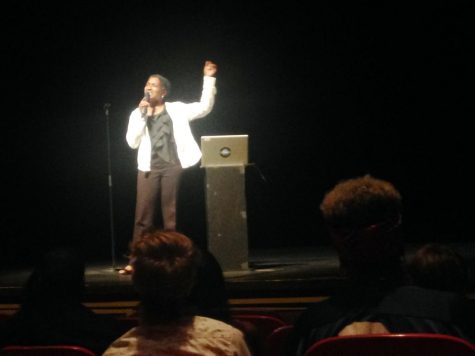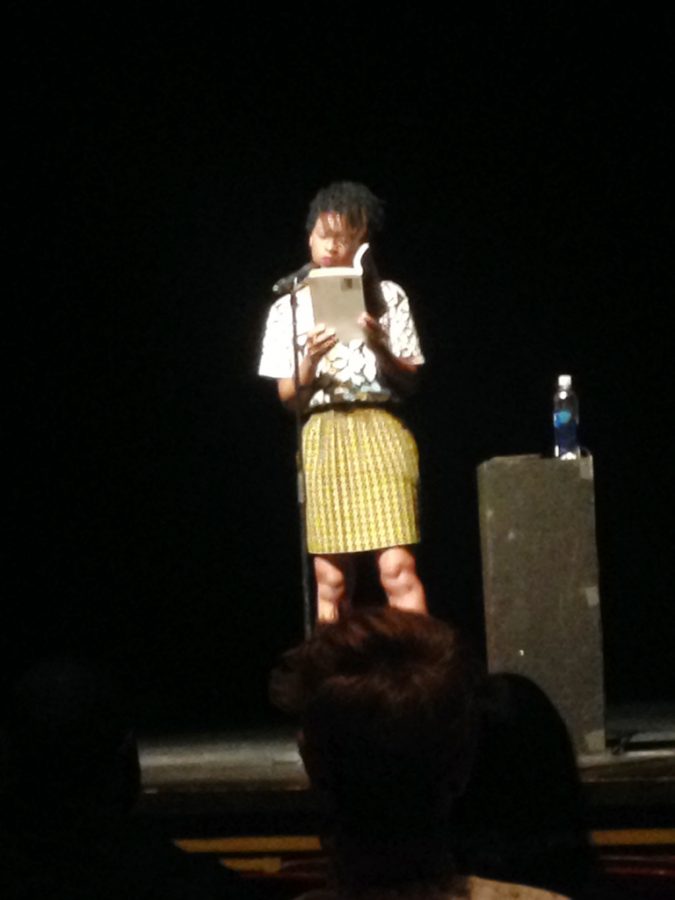Black poetry has a well-established home in Pittsburgh.
The Kelly Strayhorn Theater hosted four poets on Sunday, June 19, to celebrate the 20th anniversary of Cave Canem — Latin for “beware the dog” and pronounced “Kah-veh Kah-nem” — a nonprofit literary organization that highlights and sponsors African American poets. Pitt’s Center for African American Poetry and Poetics and PNC co-sponsored the event as part of East Liberty LIVE!, which spans more than 20 events throughout the summer.
Terrance Hayes, the co-director of the CAAPP, explained the event as a way to engage the city and the University.
“A lot of what we do at the University is always on the University, so we sorta felt like one great idea is to take the University and move it into the city,” Hayes said.
Sunday was many important days all wrapped into one. It was Father’s Day. It was Juneteenth, the anniversary of slavery’s official end in the Confederate South. It also marked the first full week since the Pulse shooting in Orlando. All of these thoughts held sway over the theater as the poets, all Cave Canem Fellows, took the stage one by one.
The featured poets were Camille Rankine, author of “Incorrect Merciful Impulses,” and Danez Smith, a 2011 Individual World Poetry Slam finalist and founding member of the multi-genre spoken-word collective Dark Noise. Also featured were Tyehimba Jess, author of “leadbelly” and “Olio,” and Duriel E. Harris, associate professor of English at Illinois State University, author of several collections of poetry and a co-founder of the Black Took Collective.
Rankine started off the event with a few poems from her book, including “Possession,” dealing with a case of unhealthy dedication.
“My arms are full, the other shore besieged by longing,” she read. “I am a sickness. I want to give you more.”
Rankine went on to read her poem “The Increasing Frequency of Black Swans,” which was inspired by the black swan event theory, a metaphor for a surprising event that drastically changes everything surrounding it.
“The grief is a planet,” Rankine reads. “A dust ring. A small moon that’s been hidden under my pillow, that’s been changing the way my body moves this whole time.”
Rankine, whose parents are Jamaican immigrants, also read her poem “The Free World,” which she dubbed her “complicated love letter to America.”
“I thought this was meant to be a romance: I was delivered here in order to love you. I was delivered here and ordered to love you. If we could be friends. I wore this new dress for you.”
Rankine’s delivery was the most traditional of the featured poets. The remaining readers veered into the experimental.
Danez Smith doesn’t recite poems so much as he gesticulates stories at the crowd. Smith moved the entire theater with a shortened version of his poem “summer, somewhere,” in which he imagines an alternate heaven exclusively for young black boys who were murdered.
“History is what it is,” Smith said. “It knows what it did.”
Smith’s poem sketches a sanctuary where blood-stained shirts become ruby gowns, and the color white is absent enough for even the snow to fall black.
“Please, don’t call us dead, call us alive someplace better,” Smith read. “We say our own names when we pray. We go out for sweets & come back.”
Near the end of the excerpt, Smith reminded the audience that this imagined heaven comes at a cost.
“You are not welcome here,” Smith said. “Trust the trip will kill you. Go home. We earned this paradise by a death we didn’t deserve.”
As Smith reads, a black girl in a sports jersey bows her head as another consoles her by placing a hand on her shoulder. The poem’s impact is clear. These rhymes cut deep, but the feelings behind them cut deeper still.
Smith lightened the mood with a few of his other poems, which dealt with subjects from 90s R&B music videos to Prince (a series titled “Purple Sonnets”) and a potential movie pitch. The latter was the focus of Dinosaurs in the Hood, describing a film that would be “Jurassic Park meets Friday meets The Pursuit of Happyness.” Smith used the pitch to talk about making the ideal movie, devoid of stereotypes.
“I don’t want any racist [stuff] about Asian people or overused Pan-Latino stereotypes. This movie is about a neighborhood of royal folks — children of slaves and immigrants and addicts and exiles — saving their town from dinosaurs,” Smith said.
Tyehimba Jess started his reading by thanking the poets and the CAAPP for hosting the event, stating that “this is my summer right here.”
Jess read from his poem “Infernal,” which dealt with his father and his childhood in Detroit.
“We survived,” Jess read, “mostly by fleeing the flames while sealing their heat in our minds the way a bank holds a mortgage — the way a father holds his son’s hand while his city burns around him…”
Jess also read an excerpt from his book “leadbelly” — complete with a quick rendition of legendary blues musician Lead Belly’s song “Pick a Bale of Cotton,” which Lead Belly originally sang while picking cotton at Sugarland, a prison plantation.

The event’s last poet, Duriel Harris, read a variety of poems, including “Simulacra: Black Mary Integrates the Schoolhouse.”
“Mary had a little lamb, little lamb, little lamb,” Harris read. “Mary had a little lamb whose fleece was black as sullied snow.”
Harris is also a sound artist, which became clear when she blasted pounding music through the theater’s speakers from a laptop, encouraging the audience to get to their feet. Harris sang her poem “Danger, Live Feed,” which includes repetitive stanzas such as “You’re a black thing. A fiction. A dialect. A guttural conviction. A treacherous petition.”
Harris ended her time by playing more music while simultaneously playing quotes from famous African American poets and writers over the club noise.
Hayes stressed the importance of engaging students with poetry and the city itself.
“I think students, especially if they’re not from Pittsburgh, that come to Pitt and never really knew about this space or East Liberty or the East side, we feel like, ‘oh, that’s something we could do,’ go listen to some art at other venues.”
One student, Davon Clark, a secondary education major at Penn State who is also a poet and member of Pittsburgh’s Steel City Slam team, expressed his admiration for the event and the poets in particular, on such a memorable day.
“Overall, it being Juneteenth,” Clark said. “Just hearing people prospering, especially in a time where it seems very hard to keep fighting for things. Having a light guide me at the end of that, seeing that there’s other people, that are also having to fight other people, that are winning that fight, so it’s cool to see that.”
Cave Canem’s goal has always been to give a voice to African American poets, but it’s also an attempt to redefine or challenge what is possible in poetry. Hayes echoed this by defining what poetry, or poetics, really are.
“Poetics are like beauty, it’s like aesthetics,” Hayes said. “So it’s beauty of language, but it’s also like the poetics of Lebron James, the poetics of space, the poetics of architecture. This is where you’ll see it showing up, just in culture, something is poetic. So what we’re saying is that it’s not just about poems.”



